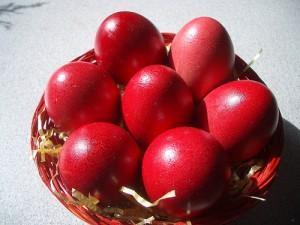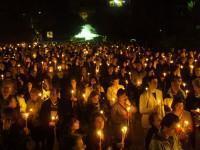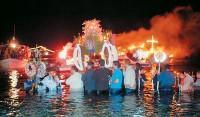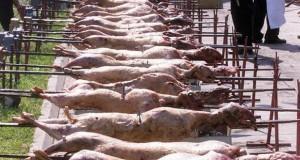Easter in Greece
...As you are walking with your lit candle in the procession or if you are just looking upon it from the sidelines, you will become overwhelmed with a feeling of unity. Looking over thousands of candles in the hands of men, women and children, people in the square, those on their balcony overlooking the square, shop owners standing on their doorsteps with a candle in hand, the chanting, the mourning… This is an entire community coming together in lamentation over the death of Jesus Christ... No matter where you celebrate Easter in Greece, it is sure to be an experience you will never forget.
 In Greece, religion is a part of everyday life. The dominating religion here is Greek Orthodox, which is Christian and very similar to the Roman Catholic religion. Easter celebrations begin 7 weeks prior to Easter with the Carnival Season, called the “Apokries.” All Sundays and the last weekend of Carnival are festive, with In Greece, religion is a part of everyday life. The dominating religion here is Greek Orthodox, which is Christian and very similar to the Roman Catholic religion. Easter celebrations begin 7 weeks prior to Easter with the Carnival Season, called the “Apokries.” All Sundays and the last weekend of Carnival are festive, with parades all over the country. (It should be noted, though, that Carnival festivities in Northern Greece take place in January, irrelatively to Easter, and are mainly spontaneously organized). The largest official Carnival Parade is in Patras which is about a 3 hour drive, south of Athens into the Peloponnese. The last day of carnival is marked with a burning of the floats at midnight on the beach and the next day is the first day of Lent, called “Clean Monday” or in Greek, “Kathara Defthera.” parades all over the country. (It should be noted, though, that Carnival festivities in Northern Greece take place in January, irrelatively to Easter, and are mainly spontaneously organized). The largest official Carnival Parade is in Patras which is about a 3 hour drive, south of Athens into the Peloponnese. The last day of carnival is marked with a burning of the floats at midnight on the beach and the next day is the first day of Lent, called “Clean Monday” or in Greek, “Kathara Defthera.”
Clean Monday is the day that we clean up after the carnival and we clean out our fridge for fasting. Eggs, meat, cheese and depending upon how rigorously you plan to fast, you may even put the oils away. The day is celebrated by going to the countryside to enjoy a meal and fly your kite. We paid an exceptional visit to Kalambaka (Meteora) last year for this celebration as the municipality offered traditional bean soup “Fasolada”, halvas, “Lagana” (which is a bread specially prepared for this day only and it is made for fasting and without yeast), olives and, of course, wine and music; all for free! The day was perfectly sunny and warm with a breeze strong enough to get our kites up high. Fasting will continue for the next 7 weeks until Easter Sunday.
Holy week is the 7 days before and including Easter Sunday. This is truly the best time of the year to be in Greece no matter your confessions. The locals will go to Church every day throughout this week as special liturgies are read each day. In the morning on Holy Thursday the parishioners are called to receive Holy Communion which represents the earthly presence of Christ as he did at the Last Supper, and the events that led to Jesus' crucifixion. In the evening of Holy Thursday the Greek Orthodox Church will have the preparation for the “Epitafios” which literally translates to “funeral liturgy on the grave”. That evening parishioners will prepare a symbolic coffin, lavishly adorned with flowers and have it available for worshiping at the Church. It is the reliving of the burial of Christ.
Waking up for your first time on Good Friday in Greece is something you will never forget. The church bells start ringing very early in the morning with a slow ominous “ding… ding-ding... ding...” This goes on throughout the day at specific intervals. In Greece when a person dies the Church rings the bell in the morning to notify the parishioners that there will be a burial that day. On Good Friday the bells ring throughout the day as a constant reminder. The streets will be quiet that morning which brings upon a sort of undeniable sadness in the air. Shops stay closed until 12 noon. That afternoon the priest will take the body of Christ down from the crucifix, wrap it in a shroud and place it on the altar. Following the service called “the Lamentations at the Tomb,” the priest will carry the Epitaphios (Epitaph-which is a painted cloth likeness of Christ) and place it in the coffin as a symbol of the Tomb of Christ. The priest will then lead a procession out of the Church and into the village square with reverent people carrying the Epitaphios. Each parishioner will hold a lit candle and chant hymns as they walk through the alleys and cobbled streets of the parishes. In some places they even walk into the sea-water.
I can describe Good Friday in as much detail as possible but there is one aspect present that you can only understand if you are physically there to experience it. As you are walking with your lit candle in the procession or if you are just looking upon it from the sidelines, you will become overwhelmed with a feeling of unity. Looking over thousands of candles in the hands of men, women and children, people in the square, those on their balcony overlooking the square, shop owners standing on their doorsteps with a candle in hand, the chanting, the mourning… This is an entire community coming together in lamentation over the death of Jesus Christ. It is not the typical Sunday and dragging yourself out of bed to be a good Christian who goes to Church. This is people out in the street, rain or wind and holding a candle and being part of something. So many will have tears in their eyes, it is true mourning and it is a bit overwhelming. Then, when thinking about it even more you realize that it is not only this small community where you are standing, but the entire country that has stopped everything completely to take to the streets and join the procession of their own parish. Then you realize… it is not only in Greece but this is happening with Greeks all over the world. You become part of something so vast that it has transcended more than 2000 years and has landed right in your hands as you hold a candle and comprehend the awe of it all. It gives rise to so many other realizations and questions and once you have experienced this, life has changed somehow.
By now you and your family will have purchased your “lambades.” These are the white colored candles you will use on Holy Saturday to receive the Holy Fire. Lambades are a huge business in Greece as everyone must have one and they are decorated lavishly. For the children they come with game packs, toys and in just about every theme you can imagine. You might also want to get a small lantern to bring the flame home with you, burning the doorframe slightly as you enter to keep evil out.
Holy Saturday is marked with the Greek Patriarch receiving the Holy Fire from Jerusalem. This is another amazing event and a true miracle that takes place every year. There is a church called the “Church of the Resurrection” located in the Old City of Jerusalem (also called the “Church of the Holy Sepulchre”). The Tomb of Christ is located here and at noon on Holy Saturday, several important Patriarchs enter the area known as the “Sepulchre” and pray. After their prayers a miraculous light emerges and two candles are lit from it. The area is packed with people and as soon as the first two candles are lit, other candles light spontaneously. At first the fire does not burn to the touch and many people will put their hands and faces into the flames without being burned. The flame is handed from person to person by candle and flown all over the world. Throughout the day the candle is passed from priest to priest, church to church and finally just before midnight the parishioners will go out into the courtyard of the Church and receive the flame for their own lambades. Moments later at precisely midnight, the church bells will ring frantically signifying the resurrection of Christ. The priest will loudly proclaim “Christos Anesti, Christos Anesti!” (Christ has risen)!! Fireworks and fire crackers can be heard everywhere; there is no sleep for the wicked this night!
 The lamb has been slaughtered and we return home after midnight to eat a meal of soup called “Mageiritsa” made from the entrails of the animal,the first meat consumed in more than 40 days; the lamb itself is already on the spit in some cool part of the house, waiting until the next morning to be roasted. In the morning after the Easter service we set to work in preparation for the feast. Easter is called “Pascha” in Greek (same as in Hebrew) and it refers to “The Feast of Feasts.” People gather together to celebrate and roast a lamb on a spit over an open flame, the lamb symbolizing Jesus who offered himself to sacrifice to save the souls of humanity. Easter eggs have been dyed red to symbolize the blood of Christ and will be present on every Easter table. There will be home-made wine flowing, music playing and a lighthearted feeling throughout the countryside. In some areas of Greece rows of lambs are roasted in the village square, in other areas the town shouts “Judas!”, in yet another a huge pile of wood topped with a Judas Dummy is set on fire. Some islands have very peculiar customs, for example Corfu, where people throw out of their windows or down from their balconies clay containers, big and small, to smash on the street pavement. So, if in Corfu on Easter Day, look out! The lamb has been slaughtered and we return home after midnight to eat a meal of soup called “Mageiritsa” made from the entrails of the animal,the first meat consumed in more than 40 days; the lamb itself is already on the spit in some cool part of the house, waiting until the next morning to be roasted. In the morning after the Easter service we set to work in preparation for the feast. Easter is called “Pascha” in Greek (same as in Hebrew) and it refers to “The Feast of Feasts.” People gather together to celebrate and roast a lamb on a spit over an open flame, the lamb symbolizing Jesus who offered himself to sacrifice to save the souls of humanity. Easter eggs have been dyed red to symbolize the blood of Christ and will be present on every Easter table. There will be home-made wine flowing, music playing and a lighthearted feeling throughout the countryside. In some areas of Greece rows of lambs are roasted in the village square, in other areas the town shouts “Judas!”, in yet another a huge pile of wood topped with a Judas Dummy is set on fire. Some islands have very peculiar customs, for example Corfu, where people throw out of their windows or down from their balconies clay containers, big and small, to smash on the street pavement. So, if in Corfu on Easter Day, look out!
Mykonos is one of the biggest destinations for celebrating Easter and every year the island is packed to full capacity for a few days.
No matter where you celebrate Easter in Greece, it is sure to be an experience you will never forget. |
|



